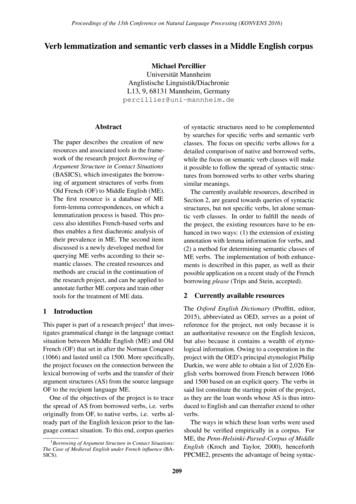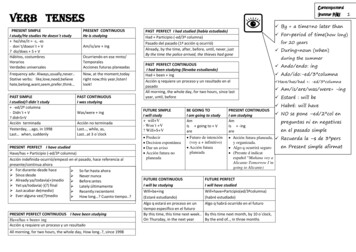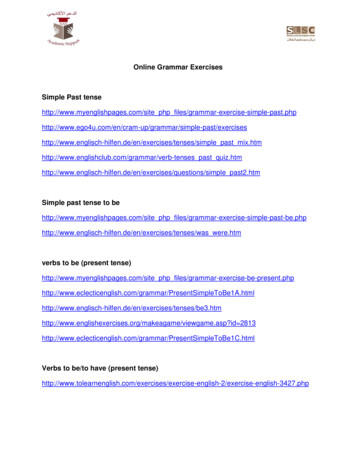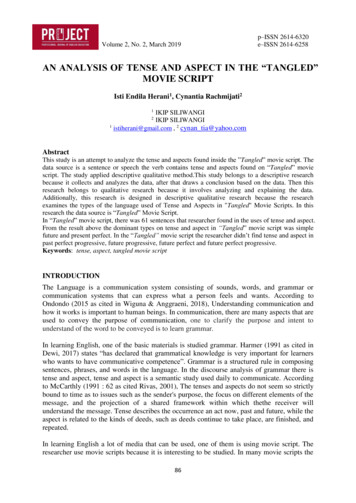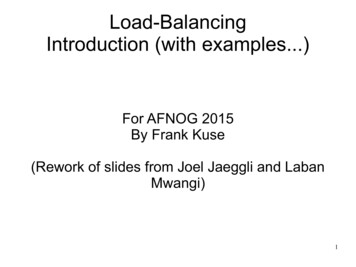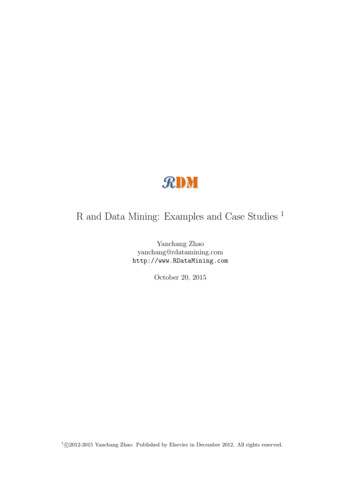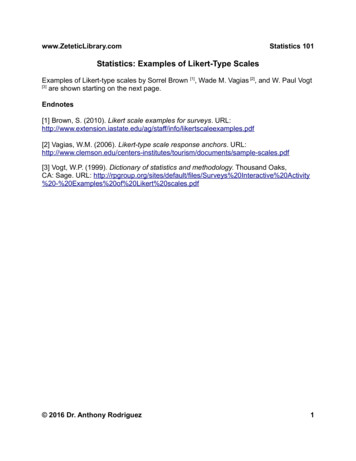
Transcription
http://www.englishpage.comVerb Tense Overview with ExamplesSimple PresentSimple PastSimple FutureI study English every day.Two years ago, I studiedEnglish in England.If you are having problems, Iwill help you study English.I am going to study Englishnext year.Present ContinuousPast ContinuousFuture ContinuousI am studying English now.I was studying English whenyou called yesterday.I will be studying Englishwhen you arrive tonight.I am going to be studyingEnglish when you arrivetonight.Present PerfectPast PerfectFuture PerfectI have studied English inseveral different countries.I had studied a little Englishbefore I moved to the U.S.I will have studied every tenseby the time I finish this course.I am going to have studiedevery tense by the time I finishthis course.Present Perfect ContinuousPast Perfect ContinuousFuture Perfect ContinuousI have been studying Englishfor five years.I had been studying Englishfor five years before I movedto the U.S.I will have been studyingEnglish for over two hours bythe time you arrive.I am going to have beenstudying English for over twohours by the time you arrive.
http://www.englishpage.comSimple PresentFORM[VERB] s/es in third personExamples: You speak English.Do you speak English?You do not speak English.USE 1 Repeated ActionsUse the Simple Present to express the idea that an action is repeated or usual. The action can be ahabit, a hobby, a daily event, a scheduled event or something that often happens. It can also besomething a person often forgets or usually does not do.Examples: I play tennis.She does not play tennis.Does he play tennis?The train leaves every morning at 8 AM.The train does not leave at 9 AM.When does the train usually leave?She always forgets her purse.He never forgets his wallet.Every twelve months, the Earth circles the Sun.Does the Sun circle the Earth?USE 2 Facts or GeneralizationsThe Simple Present can also indicate the speaker believes that a fact was true before, is true now,and will be true in the future. It is not important if the speaker is correct about the fact. It is alsoused to make generalizations about people or things.Examples:
http://www.englishpage.com Cats like milk.Birds do not like milk.Do pigs like milk?California is in America.California is not in the United Kingdom.Windows are made of glass.Windows are not made of wood.New York is a small city. It is not important that this fact is untrue.USE 3 Scheduled Events in the Near FutureSpeakers occasionally use Simple Present to talk about scheduled events in the near future. This ismost commonly done when talking about public transportation, but it can be used with otherscheduled events as well.Examples: The train leaves tonight at 6 PM.The bus does not arrive at 11 AM, it arrives at 11 PM.When do we board the plane?The party starts at 8 o'clock.When does class begin tomorrow?USE 4 Now (Non-Continuous Verbs)Speakers sometimes use the Simple Present to express the idea that an action is happening or is nothappening now. This can only be done with Non-Continuous Verbs and certain Mixed Verbs.Examples: I am here now.She is not here now.He needs help right now.He does not need help now.He has his passport in his hand.Do you have your passport with you?ADVERB PLACEMENT
http://www.englishpage.comThe examples below show the placement for grammar adverbs such as: always, only, never, ever,still, just, etc.Examples: You only speak English.Do you only speak English?ACTIVE / PASSIVEExamples: Once a week, Tom cleans the car. ActiveOnce a week, the car is cleaned by Tom. Passive
http://www.englishpage.comPresent ContinuousFORM[am/is/are present participle]Examples: You are watching TV.Are you watching TV?You are not watching TV.USE 1 NowUse the Present Continuous with Normal Verbs to express the idea that something is happeningnow, at this very moment. It can also be used to show that something is not happening now.Examples: You are learning English now.You are not swimming now.Are you sleeping?I am sitting.I am not standing.Is he sitting or standing?They are reading their books.They are not watching television.What are you doing?Why aren't you doing your homework?USE 2 Longer Actions in Progress NowIn English, "now" can mean: this second, today, this month, this year, this century, and so on.Sometimes, we use the Present Continuous to say that we are in the process of doing a longer actionwhich is in progress; however, we might not be doing it at this exact second.Examples: (All of these sentences can be said while eating dinner in a restaurant.)
http://www.englishpage.com I am studying to become a doctor.I am not studying to become a dentist.I am reading the book Tom Sawyer.I am not reading any books right now.Are you working on any special projects at work?Aren't you teaching at the university now?USE 3 Near FutureSometimes, speakers use the Present Continuous to indicate that something will or will not happenin the near future.Examples: I am meeting some friends after work.I am not going to the party tonight.Is he visiting his parents next weekend?Isn't he coming with us tonight?USE 4 Repetition and Irritation with "Always"The Present Continuous with words such as "always" or "constantly" expresses the idea thatsomething irritating or shocking often happens. Notice that the meaning is like Simple Present, butwith negative emotion. Remember to put the words "always" or "constantly" between "be" and"verb ing."Examples: She is always coming to class late.He is constantly talking. I wish he would shut up.I don't like them because they are always complaining.REMEMBER Non-Continuous Verbs/ Mixed VerbsIt is important to remember that Non-Continuous Verbs cannot be used in any continuous tenses.Also, certain non-continuous meanings for Mixed Verbs cannot be used in continuous tenses.Instead of using Present Continuous with these verbs, you must use Simple Present.
http://www.englishpage.comExamples: She is loving this chocolate ice cream. Not CorrectShe loves this chocolate ice cream. CorrectADVERB PLACEMENTThe examples below show the placement for grammar adverbs such as: always, only, never, ever,still, just, etc.Examples: You are still watching TV.Are you still watching TV?ACTIVE / PASSIVEExamples: Right now, Tom is writing the letter. ActiveRight now, the letter is being written by Tom. Passive
http://www.englishpage.comPresent PerfectFORM[has/have past participle]Examples: You have seen that movie many times.Have you seen that movie many times?You have not seen that movie many times.USE 1 Unspecified Time Before NowWe use the Present Perfect to say that an action happened at an unspecified time before now. Theexact time is not important. You CANNOT use the Present Perfect with specific time expressionssuch as: yesterday, one year ago, last week, when I was a child, when I lived in Japan, at thatmoment, that day, one day, etc. We CAN use the Present Perfect with unspecific expressions suchas: ever, never, once, many times, several times, before, so far, already, yet, etc.Examples: I have seen that movie twenty times.I think I have met him once before.There have been many earthquakes in California.People have traveled to the Moon.People have not traveled to Mars.Have you read the book yet?Nobody has ever climbed that mountain.A: Has there ever been a war in the United States?B: Yes, there has been a war in the United States.How Do You Actually Use the Present Perfect?The concept of "unspecified time" can be very confusing to English learners. It is best to associatePresent Perfect with the following topics:TOPIC 1 ExperienceYou can use the Present Perfect to describe your experience. It is like saying, "I have the experienceof." You can also use this tense to say that you have never had a certain experience. The PresentPerfect is NOT used to describe a specific event.Examples:
http://www.englishpage.com I have been to France.This sentence means that you have had the experience of being in France. Maybe you havebeen there once, or several times.I have been to France three times.You can add the number of times at the end of the sentence.I have never been to France.This sentence means that you have not had the experience of going to France.I think I have seen that movie before.He has never traveled by train.Joan has studied two foreign languages.A: Have you ever met him?B: No, I have not met him.TOPIC 2 Change Over TimeWe often use the Present Perfect to talk about change that has happened over a period of time.Examples: You have grown since the last time I saw you.The government has become more interested in arts education.Japanese has become one of the most popular courses at the university since the Asianstudies program was established.My English has really improved since I moved to Australia.TOPIC 3 AccomplishmentsWe often use the Present Perfect to list the accomplishments of individuals and humanity. Youcannot mention a specific time.Examples: Man has walked on the Moon.Our son has learned how to read.Doctors have cured many deadly diseases.Scientists have split the atom.TOPIC 4 An Uncompleted Action You Are ExpectingWe often use the Present Perfect to say that an action which we expected has not happened. Usingthe Present Perfect suggests that we are still waiting for the action to happen.Examples: James has not finished his homework yet.Susan hasn't mastered Japanese, but she can communicate.Bill has still not arrived.The rain hasn't stopped.TOPIC 5 Multiple Actions at Different TimesWe also use the Present Perfect to talk about several different actions which have occurred in thepast at different times. Present Perfect suggests the process is not complete and more actions arepossible.
http://www.englishpage.comExamples: The army has attacked that city five times.I have had four quizzes and five tests so far this semester.We have had many major problems while working on this project.She has talked to several specialists about her problem, but nobody knows why she is sick.Time Expressions with Present PerfectWhen we use the Present Perfect it means that something has happened at some point in our livesbefore now. Remember, the exact time the action happened is not important.Sometimes, we want to limit the time we are looking in for an experience. We can do this withexpressions such as: in the last week, in the last year, this week, this month, so far, up to now, etc.Examples: Have you been to Mexico in the last year?I have seen that movie six times in the last month.They have had three tests in the last week.She graduated from university less than three years ago. She has worked for three differentcompanies so far. My car has broken down three times this week.NOTICE"Last year" and "in the last year" are very different in meaning. "Last year" means the year beforenow, and it is considered a specific time which requires Simple Past. "In the last year" means from365 days ago until now. It is not considered a specific time, so it requires Present Perfect.Examples: I went to Mexico last year.I went to Mexico in the calendar year before this one.I have been to Mexico in the last year.I have been to Mexico at least once at some point between 365 days ago and now.USE 2 Duration From the Past Until Now (Non-Continuous Verbs)
http://www.englishpage.comWith Non-Continuous Verbs and non-continuous uses of Mixed Verbs, we use the Present Perfect toshow that something started in the past and has continued up until now. "For five minutes," "for twoweeks," and "since Tuesday" are all durations which can be used with the Present Perfect.Examples: I have had a cold for two weeks. She has been in England for six months. Mary has loved chocolate since she was a little girl.Although the above use of Present Perfect is normally limited to Non-Continuous Verbs and noncontinuous uses of Mixed Verbs, the words "live," "work," "teach," and "study" are sometimes usedin this way even though they are NOT Non-Continuous Verbs.ADVERB PLACEMENTThe examples below show the placement for grammar adverbs such as: always, only, never, ever,still, just, etc.Examples: You have only seen that movie one time.Have you only seen that movie one time?ACTIVE / PASSIVEExamples: Many tourists have visited that castle. ActiveThat castle has been visited by many tourists. Passive
http://www.englishpage.comPresent Perfect ContinuousFORM[has/have been present participle]Examples: You have been waiting here for two hours.Have you been waiting here for two hours?You have not been waiting here for two hours.USE 1 Duration from the Past Until NowWe use the Present Perfect Continuous to show that something started in the past and has continuedup until now. "For five minutes," "for two weeks," and "since Tuesday" are all durations which canbe used with the Present Perfect Continuous.Examples: They have been talking for the last hour.She has been working at that company for three years.What have you been doing for the last 30 minutes?James has been teaching at the university since June.We have been waiting here for over two hours!Why has Nancy not been taking her medicine for the last three days?USE 2 Recently, LatelyYou can also use the Present Perfect Continuous WITHOUT a duration such as "for two weeks."Without the duration, the tense has a more general meaning of "lately." We often use the words"lately" or "recently" to emphasize this meaning.Examples: Recently, I have been feeling really tired.She has been watching too much television lately.Have you been exercising lately?
http://www.englishpage.com Mary has been feeling a little depressed.Lisa has not been practicing her English.What have you been doing?IMPORTANTRemember that the Present Perfect Continuous has the meaning of "lately" or "recently." If you usethe Present Perfect Continuous in a question such as "Have you been feeling alright?", it cansug
I am studying to become a doctor. I am not studying to become a dentist. I am reading the book Tom Sawyer. I am not reading any books right now. Are you working on any special projects at work? Aren't you teaching at the university now? USE 3 Near Future Sometimes, speakers use the Present Continuous to indicate that something will or will not happen in the near future.
